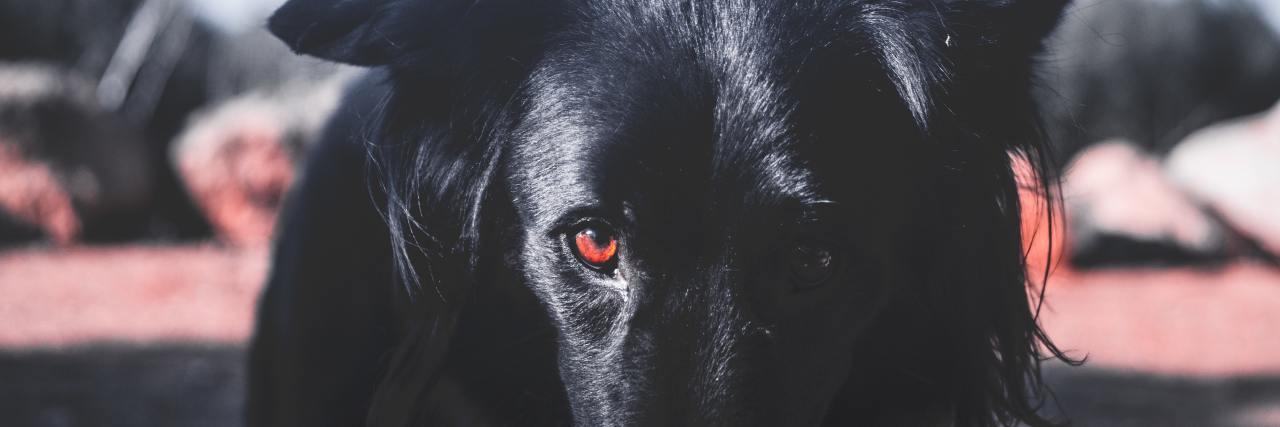How I'm Taming the Black Dog of My Bipolar Depression
Editor's Note
If you or a loved one is affected by addiction, the following post could be triggering. You can contact SAMHSA’s hotline at 1-800-662-4357.
My depression is an old black dog with a gray muzzle, red-rimmed eyes and wet fur. He shows up at my doorstep a few times a year, comes inside, and lies down at my feet — or on them. He follows me everywhere. Though he is usually quiet, he demands food and water. He eats my motivation, creativity and empathy. If he’s really hungry, his favorite meal is the juicy steak of my self-worth. He drinks my tears so I cannot cry, cannot let go and let in grace.
• What is Bipolar disorder?
I know when he is coming to visit days before his arrival. I shy away from daily meditation, and lose the disciplines of exercise and keeping a journal. I falter, lose meaning and motivation, forget things, and eventually isolate in an internal mind-closet, praying he won’t find me there. A surge of hypomania attempts to keep me smiling, distracting me from what’s coming. In the past, before medication, talking therapy and meditation, I would ignore his approach and try anything possible — alcohol, drugs, sex, compulsive spending, food, pornography, television, cigarettes and kite-flying euphoric denial — to bar the door against him. He wasn’t quiet on those days. He would snarl and bark, hurling himself at the door, knocking it in with a huff and a puff, and climb on my chest, pinning me to the bed with all of his weight until I acknowledged him. Then he would bite my heart and feed on me with a vengeance.
What’s different now? I’m not hiding in the mind-closet very long before I crawl out and face the black dog. I trust the impermanence of depressive and hypomanic episodes after decades of pain, inquiry and compassion. Medication, meditation and connecting instead of isolating take time to work, and these are tools that work.
Have you ever met someone who was truly happy? Not “seems pretty happy most of the time,” but someone who remains committed to happiness as their set-point in spite of life taking a well-leveled punch at them from time to time? I suppose I have. I have evidence these people exist and have evidence that it’s possible to be one of those people. What I’m learning to ask is not “Can I become someone who is genuinely happy and content most of the time?” but, “Can I accept all of who I am, no matter who I am?”
I’ve learned that my melancholic periods and internal journeys are healthy, and different than bipolar depression episodes. These introspective deep dives balance me, and I am able to create some beautiful work during these times. They remind me to journal, investigate and research. They assure me that thoughts and feelings aren’t facts and will pass like clouds. Rather than the loss of motivation, shame and self-blame that accompany depression, these times gently move me forward.
Depression has been my shameful secret since I was a teenager. Rather than admit I needed help, I smiled and kept life moving at a breakneck pace in order to outrun the black dog. It led me to make choices that had unfortunate consequences for my health, and toward isolation and ghosting friends who didn’t understand why I would disappear and reappear again as if nothing had happened. I can recognize depression‘s approach now, allow it to come (because letting it in is far better than having it batter my door down), investigate the feelings and messages of depression, and discover answers to the questions, “Where does it hurt in my body? What’s the unmet need right now?”
Depression has made me a kinder and more discerning person, and I can speak its complex language and dialects with others, even though their collected experiences with depression are as unique as snowflakes.
The black dog has taught me that fear and resistance only make him stronger, and my curiosity to know him better makes him tamer. He has shown me how I might bring awareness and compassion to another person fighting a losing battle with their depression. I stopped resisting, surrendered and opened my door to the black dog.
“Oh. You again,” I sighed, “Okay. Come on in.” Only this time I added, “You can stay. But this time, not for so long. I’ve got some work to do.”
He grumbled a little but he acquiesced. The black dog respects me now, and I’ve learned to respect him, too.
Photo by Allan Rohmer on Unsplash

